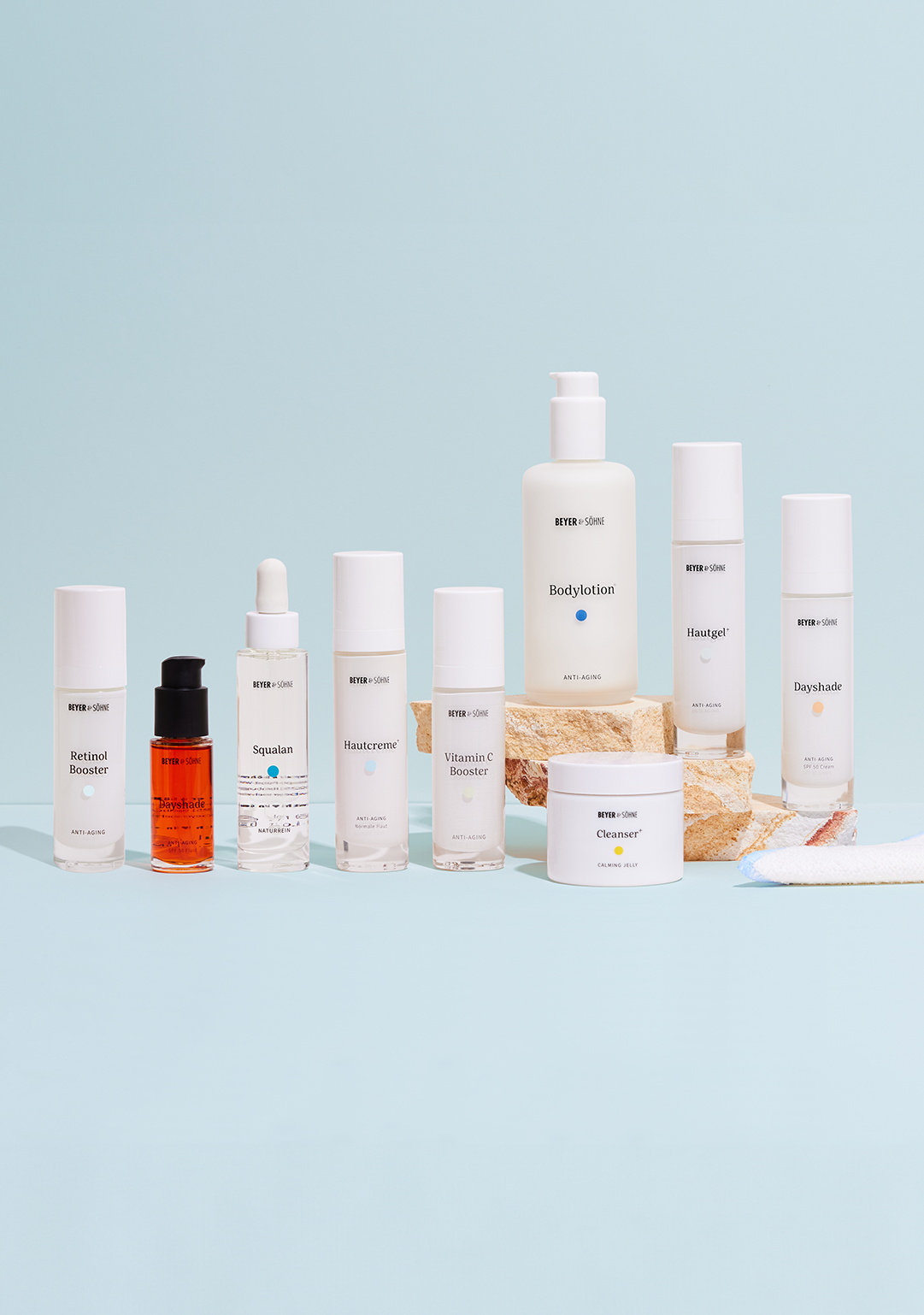Vitamin All-Rounder
Vitamin C in Skin Care - How Does It Work?
Vitamin C - we have all heard of it, but only a few know about the function of this anti-aging vitamin. How does vitamin C work in the skin? What is it doing in our facial care? Does a cream or a serum work better against wrinkles? And above all: What properties must a vitamin C cream have to be truly effective?

Robby Beyer
October 2024
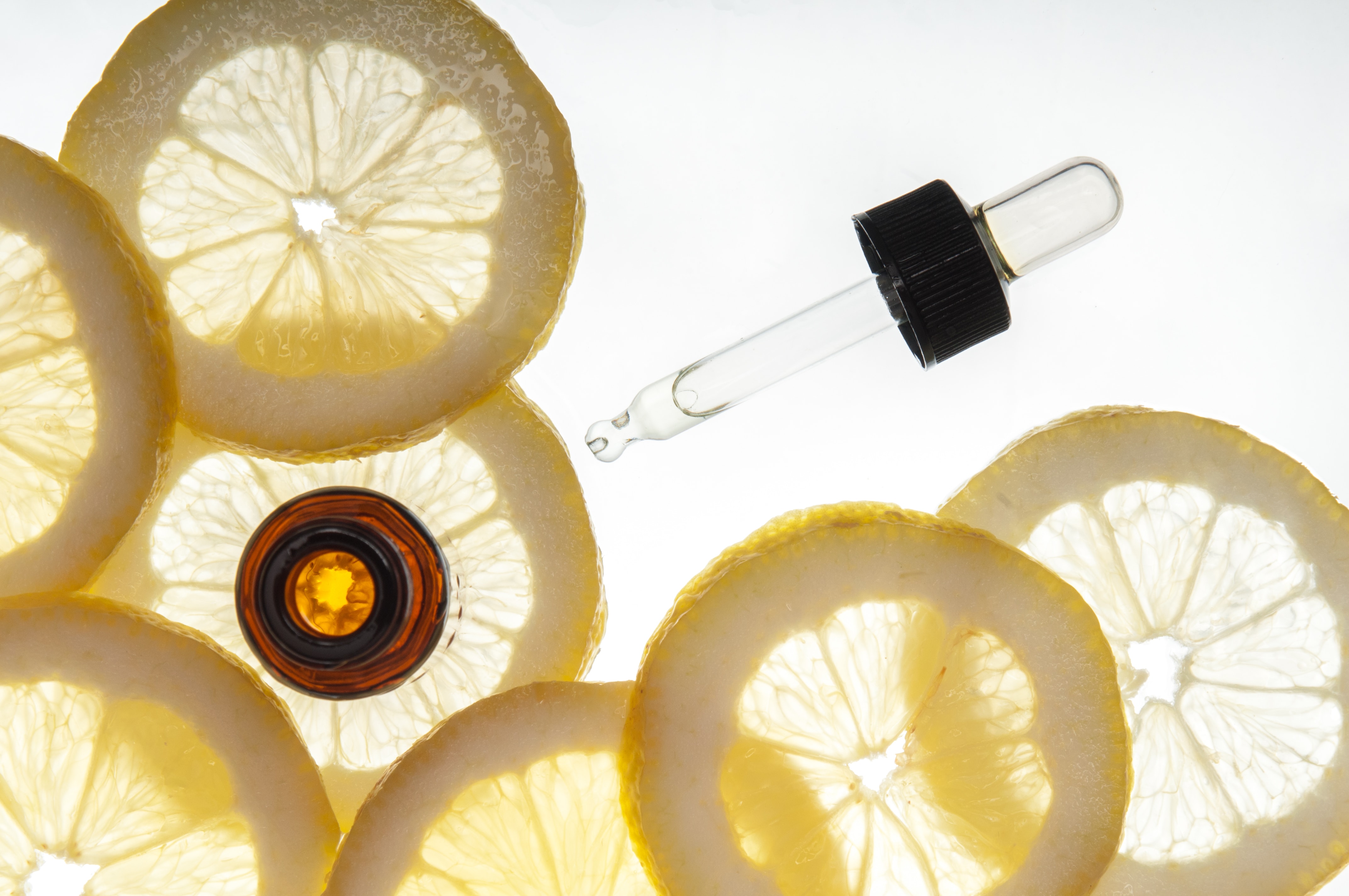
Table of Contents
Vitamin C as an Antioxidant
There are many other antioxidants
Vitamin C Against Wrinkles
Vitamin C for Acne and Pimples
Vitamin C for Pigment Spots
Which Vitamin C Form and Concentration Is the Best?
Pure Vitamin C: Effective but Not in a Cream
Vitamin C serum: How it works best
Cream With Vitamin C: Our Tip for Daily Skincare
Vitamin C for the eye area?
Vitamin C Cream: What’s the Best Concentration?
Vitamin C Cream or Serum – Which Is Better?
The Formula for Success – The Right Vitamin C in the Right Cream
Conclusion
Vitamin C supports the skin in essential functions and contributes to healthy, beautiful skin in various ways:
1.
It is an effective antioxidant that renders free radicals harmless.
2.
It is significantly involved in the formation of collagen, leading to smoother skin with fewer wrinkles."
3.
It helps with blemishes, acne and pigmentation spots.
Vitamin C as an Antioxidant
Metabolic processes in the body constantly generate new free radicals. These species are unstable and destroy cell membranes, lipids and proteins in their search for reaction partners. Since these components are essential for healthy skin, free radicals contribute to skin aging. By the way, environmental influences such as UV radiation, air pollution and cigarette smoke also generate a significant amount of free radicals.
In order to keep free radicals from harming the skin or the entire organism, we need antioxidants. These make free radicals harmless and can thus stop premature skin aging. Vitamin C is the best known antioxidant and its effect in skin care products is scientifically proven.
There are many other antioxidants
Vitamin A is considered a classic in skin care and vitamin E should also not be missing from any anti-aging cream. However, there are special antioxidants derived from nature as well. Resveratrol from grapes is known as a molecule for long life. Most effective is a complex of active ingredients that combines several antioxidants.
Vitamin C Against Wrinkles
The secret to firm skin lies in a protein called collagen. It forms the framework of the skin, providing it with the necessary firmness and elasticity. When facial wrinkles appear, it indicates that the collagen framework is not strong enough.
In this article, you will learn more about collagen, the foundation for wrinkle-free facial skin.
Vitamin C helps in two ways
: Firstly, vitamin C protects the collagen framework from free radicals that damage it. Secondly, it supports the body in producing new collagen. Thus, vitamin C ensures a healthy and stable collagen framework that can withstand greater tension and is less likely to break. The formation of wrinkles is slowed down, and your facial skin stays wrinkle-free longer.
Vitamin C therefore has a double effect against wrinkles. You can find more tips and active ingredients against wrinkles in this article.
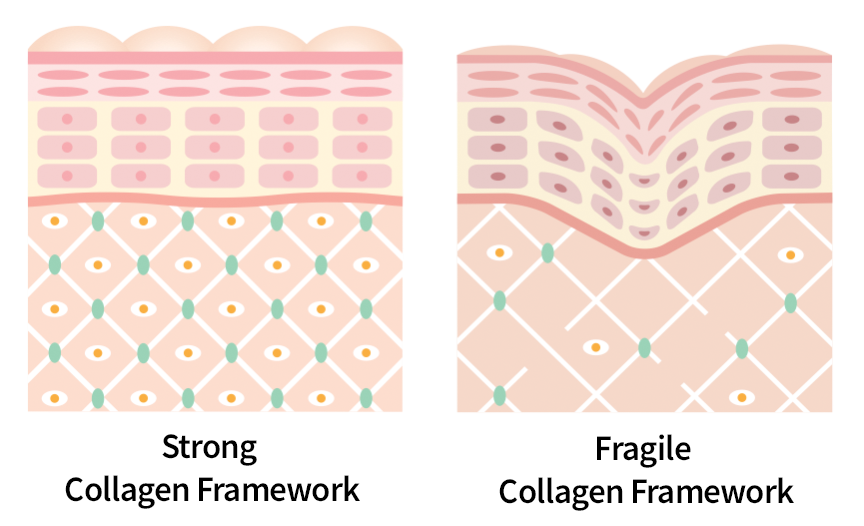
Vitamin C strengthens the collagen framework and thus acts against wrinkles
Vitamin C for Acne and Pimples
The antioxidant effect of vitamin C helps with acne and pimples. Vitamin C relieves micro-inflammation in the skin caused by acne. This anti-inflammatory effect soothes the complexion. The skin’s condition can be visibly improved as the complexion appears more even and healthier. Moreover, vitamin C can help with the progression of acne, which is also caused by oxidation processes. Therefore, vitamin C should not be missing in the treatment of acne and problematic skin.
Vitamin C for Pigment Spots
Even in cases of increased pigment spot formation, vitamin C can be beneficial. This phenomenon is referred to as
hyperpigmentation
. We want to explicitly distance ourselves from unreliable claims of healing and instead refer to the current state of research.
Studies have demonstrated that vitamin C inhibits excessive melanin production, thereby counteracting the development of age spots. Additionally, vitamin C protects our skin from UV radiation, offering photoprotective properties that can also help with age spots.
For pigment spots, we recommend implementing a daily skincare routine that includes sun protection factor and a gentle vitamin C.
In addition, a serum with pure vitamin C can help very well. Click here for our vitamin C Booster with 15% pure vitamin C.
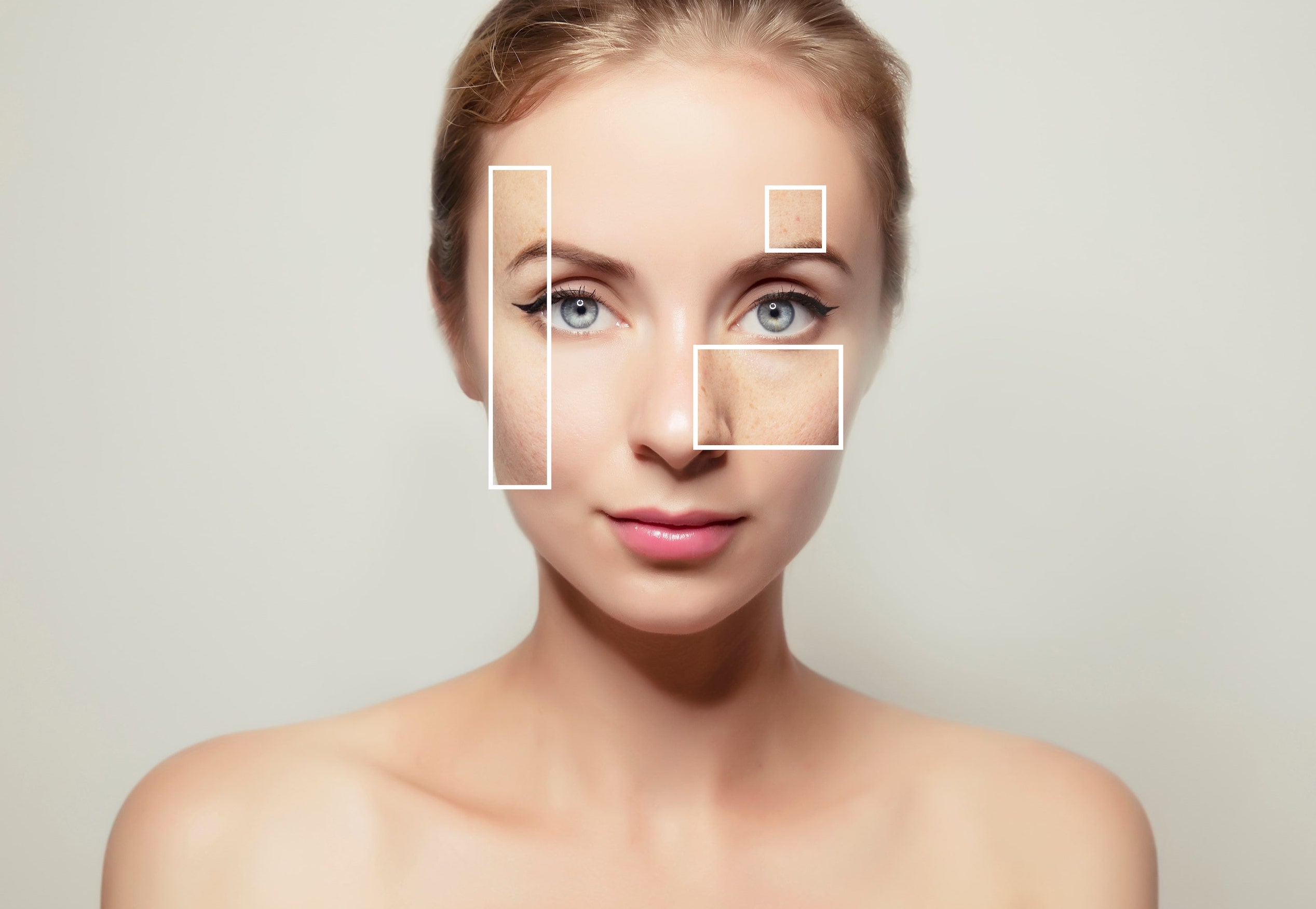
Vitamin C has been shown in studies to counteract the formation of pigmentation spots
Which Vitamin C Form and Concentration Is the Best?
We are often asked about the ideal form and concentration of vitamin C in skincare. Unfortunately, this question cannot be answered universally.
Not all vitamin C is the same
. In fact, there are many different forms of vitamin C that are suitable for external application and are used in cosmetics.
These different forms are also called
derivatives
. You have probably heard of some of these forms:
Ascorbic acid
('pure' vitamin C)
Ascorbyl glucoside
(compound between ascorbic acid and glucose)
Magnesium ascorbyl phosphate
or
sodium ascorbyl phosphate
(salt-like ester form)
Ethyl ascorbic acid
(also a water-soluble ester form)
Fat-soluble vitamin C esters, such as
ascorbyl palmitate
or
ascorbyl tetraisopalmitate
In the following paragraphs, we will discuss which of these forms can work best in skincare products. We will also address the question of when a serum and when a cream should be applied.
Pure Vitamin C: Effective but Not in a Cream
The pure form of vitamin C, ascorbic acid, or L-ascorbic acid (INCI:
Ascorbic Acid
), has the most direct effect. Unlike the other derivatives, it does not need to be converted into its active form. Ascorbic acid can also be applied daily. However, if you have sensitive skin, you should introduce it gradually.
Pure vitamin C cannot be incorporated into a cream, as it is susceptible to oxidation and breaks down quickly. However, it can be used in a serum.
Vitamin C serum: How it works best
If you're looking for the best vitamin C serum, there are several things you need to consider. In a serum with pure vitamin C, the formulation must have a strictly acidic pH value. Additionally, only an airtight pump dispenser is suitable for application.
While dropper bottles might look nice, air repeatedly gets into the serum during application. This causes the vitamin C to lose its effectiveness quickly. Concentrations of up to 15% are recommended.
We have therefore packaged our vitamin C Booster in an airtight pump dispenser and deliver it fresh from the refrigerator.
However, the higher the concentration, the more irritating it is. And beware: the effectiveness decreases again at concentrations above 20%.
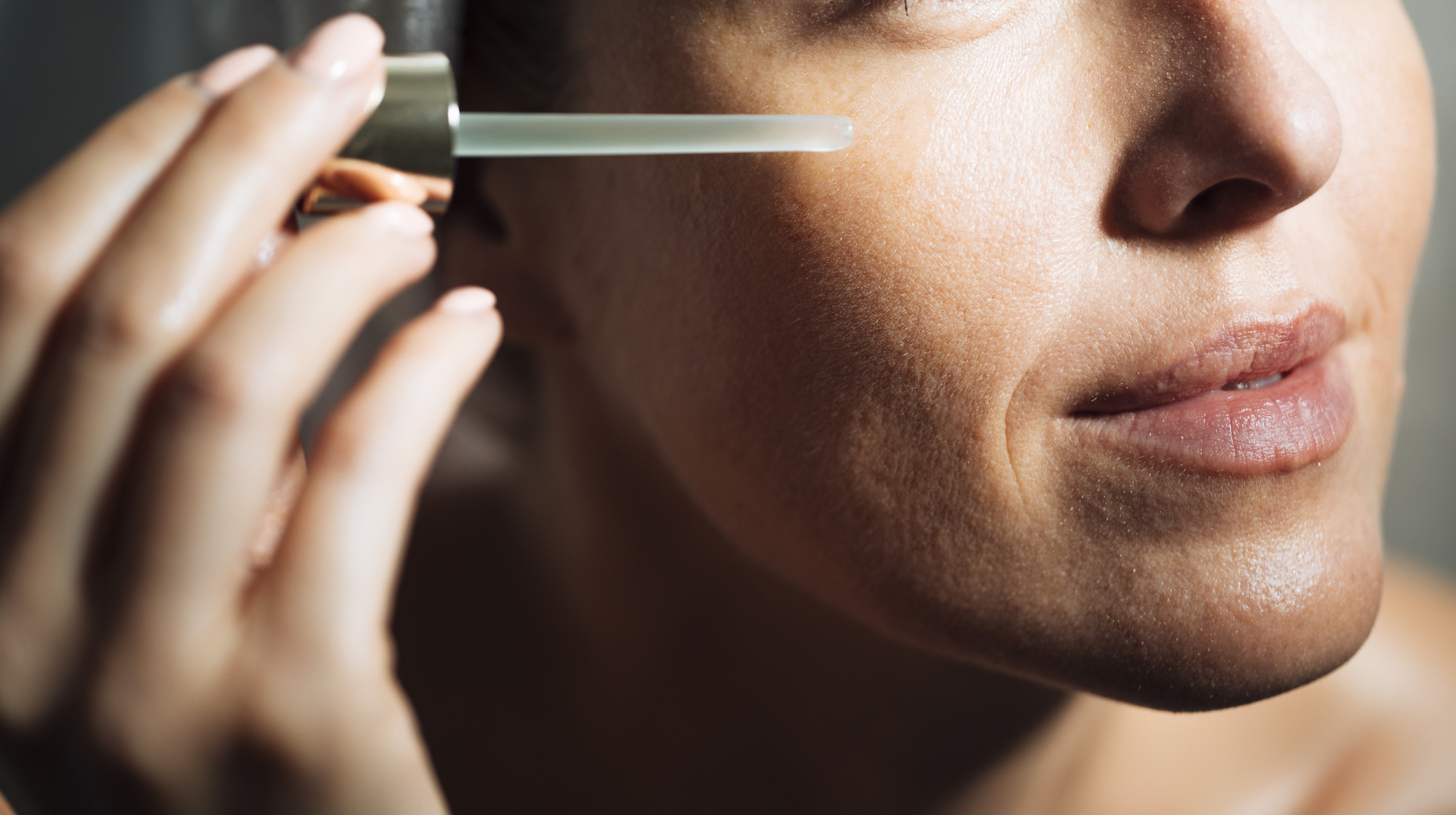
Vitamin C works well in a serum. However, make sure that it is sealed airtight. A pipette is not suitable
Cream With Vitamin C: Our Tip for Daily Skincare
A cream is particularly suitable for daily care.
Magnesium ascorbyl phosphate
is extremely well-tolerated, effective, and shows the best stability among all vitamin C derivatives in studies. This makes it a good starting point for the best vitamin C cream.
Ethyl ascorbic acid is quite new. This form is suitable for serums and gels, as well as for skincare creams. In the list of ingredients, this derivative is referred to as
3-O-ethyl ascorbic acid
or simply
ethyl ascorbic acid
.
Vitamin C for the eye area?
The same applies to the area around the eyes: gentle vitamin C is better than pure vitamin C, as pure vitamin C can be irritating. A mild form of vitamin C, however, is very suitable for eye care. This is especially important as wrinkles can quickly develop around the eyes. You can find more tips for caring for the delicate eye area in this article.
Vitamin C Cream: What’s the Best Concentration?
When it comes to creams, remember that vitamin C works differently than a long drink. A high concentration doesn't automatically mean better effectiveness. The cosmetic industry often engages in an arms race, boasting about vitamin C concentrations of up to 25%. However, caution is advised here. Too high a concentration of vitamin C can have disadvantages. The skin can become easily irritated, and redness and burning after water contact (as the skin contains a lot of water) are typical consequences.
Furthermore, it's important to note that it's not only about the vitamin C and its concentration, but also the overall formulation of the cream. If the cream structure is suitable for carrying vitamins into the skin, even a small dosage can lead to remarkable results. A blend of active ingredients with additional antioxidants and moisturizers, such as hyaluronic acid, can also improve the effect.
Vitamin C Cream or Serum – Which Is Better?
The basis of skincare is always a good cream. This shouldn't be limited to individual active ingredients, but rather should support the natural functions of the skin. With natural lipids, building blocks of the skin and extensive anti-aging ingredients. These include antioxidants like vitamin A, moisturizers like hyaluronic acid, and basic building blocks of the skin, such as ceramides. The health of the skin is holistically promoted through this combination of active agents. Further care is then unnecessary.
However, a serum can also intensively supply the skin with vitamin C. With the right formulation, it has the ability to deliver the most effective form of vitamin C to the skin: pure ascorbic acid. Additionally, a high-dose serum can be used as a booster. If a cream seems insufficient, supplementing with a serum is a viable option, but you should keep a few things in mind. You can find our vitamin C Booster here.
| Vitamin C Cream | Vitamin C Serum | |
|---|---|---|
| Purpose | All-around daily care with additional substances and active ingredients | Not a replacement for excellently formulated care, but rather an 'Anti-Aging Boost' |
| Optimal Concentration | No one-size-fits-all answer. The overall formulation is key. | Perfect Concentration: 15% - 20% Caution: Effectiveness decreases above 20% |
| Best Performance | Overall formulation and cream structure are crucial | Stabilization is critical, acidic pH, air-tight pump dispenser, no air contact, ideally refrigerated |
| Best Form | Vitamin C Derivative: Magnesium Ascorbyl Phosphate or Ethyl Ascorbic Acid | Pure Vitamin C: Ascorbic Acid, INCI: Ascorbic Acid |
The Formula for Success – The Right Vitamin C in the Right Cream
To stimulate collagen production and allow the vitamin to function as an antioxidant within the skin, you need not only the right vitamin C, but also a cream that transports the vitamin C through the skin barrier into deeper layers of the skin. This works best in a cream with the right carrier.
In our Skin Cream+, we use the skin’s own phosphatidylcholine to carry active ingredients deep into the skin. We use vitamin C in a stable and well-tolerated form –
magnesium ascorbyl phosphate
. And since our vitamin C works so well in the deeper layers of the skin, we don't need to use excessively high concentrations. This helps prevent skin irritations without sacrificing the long-term effects of vitamin C.
For comprehensive effectiveness, our Skin Cream+ contains not only vitamin C but also many other active ingredients such as vitamin A, vitamin E, resveratrol, Q10, and hyaluronic acid for additional moisture.
Of course, it is also important to consider what a skincare product doesn't contain. To avoid irritations and ensure proper efficacy, we follow a strict free-from philosophy. Mineral oils, silicones, as well as colorants and fragrances have no place in our formulation concept.
New in our range is the Skin Gel+ with two different types of vitamin C:
magnesium ascorbyl phosphate
and
ethyl ascorbic acid
. Moreover, Skin Gel+ includes additional high-dosage antioxidants (green tea and resveratrol), along with ceramides and phosphatidylcholine, the main component of every human cell membrane.
Conclusion
Studies show that vitamin C supports collagen synthesis and fights free radicals. Furthermore, it is also effective against age spots and acne. The most effective form of vitamin C is pure ascorbic acid (INCI:
ascorbic acid
), which is, however, difficult to incorporate into cosmetics. For daily skincare, we recommend a cream with a vitamin C derivative. Magnesium ascorbyl phosphate has proven to be particularly suitable here. Ethyl ascorbic acid is also stable and effective. The best effect is achieved in combination with the right base cream and other antioxidant active ingredients, as seen in our Skin Cream+.
This article was updated in
July 2019
.
Studies and Sources
Beauty Brains –
Which kind of Vitamin C is best for skin?
PubMed –
Effects of Magnesium Ascorbyl Phosphate on the Expression of Inflammatory Biomarkers after Treatment of Cultured Sebocytes with Propionibacterium acnes or Ultraviolet B Radiation
PubMed –
Inhibitory effect of magnesium L-ascorbyl-2-phosphate (VC-PMG) on melanogenesis in vitro and in vivo.
PubMed –
Vitamin C in dermatology
Wikipedia –
Ascorbinsäure
Wikipedia –
Theorie der freien Radikale
